Book contents
- Frontmatter
- Miscellaneous Frontmatter
- Editors’ Preface
- Contents
- List of Abbreviations
- List of Contributors
- PART I TOPIC OF THE YEAR
- PART II EU
- The Strange Case of Northern Ireland's Disappearing Rights in the EU-UK Withdrawal Negotiations
- Can Reasonable Accommodation Safeguard the Employment of People with Disabilities?
- Whistleblowing in Europe: A New Era of Legal Protections
- A Critical Take on Opinion 1/15: Is the Glass Half Full or Half Empty?
- Absolute Rightlessness Sur Place through Excessive Externalisation
- Corporate Accountability Mechanisms in EU Member States for Human Rights Abuses in Third Countries
- PART III CoE
- PART IV OSCE
- PART V REPORTS FROM THE FIELD
- PART VI OTHERS
- PART VII BOOK REVIEWS
- Index
Whistleblowing in Europe: A New Era of Legal Protections
from PART II - EU
Published online by Cambridge University Press: 24 January 2020
- Frontmatter
- Miscellaneous Frontmatter
- Editors’ Preface
- Contents
- List of Abbreviations
- List of Contributors
- PART I TOPIC OF THE YEAR
- PART II EU
- The Strange Case of Northern Ireland's Disappearing Rights in the EU-UK Withdrawal Negotiations
- Can Reasonable Accommodation Safeguard the Employment of People with Disabilities?
- Whistleblowing in Europe: A New Era of Legal Protections
- A Critical Take on Opinion 1/15: Is the Glass Half Full or Half Empty?
- Absolute Rightlessness Sur Place through Excessive Externalisation
- Corporate Accountability Mechanisms in EU Member States for Human Rights Abuses in Third Countries
- PART III CoE
- PART IV OSCE
- PART V REPORTS FROM THE FIELD
- PART VI OTHERS
- PART VII BOOK REVIEWS
- Index
Summary
ABSTRACT
Europe marks a new stage in protecting whistleblowers. With a vast majority, in April 2019 the European Parliament (EP) voted positively on the Directive protecting whistleblowers that for the first time offers leading legal standards across the European Union (EU). In the same month, the Council of Europe (CoE) adopted a Resolution on the local and regional protection of whistleblowers. the European Court of Human Rights (ECtHR) has also judged in favour of whistleblowers in a number of cases as part of defending freedom of expression. Whilst civil society and progressive legislators have been calling for protection of whistleblowers in Europe for over a decade, many national governments were not in favour of opening channels of disclosure for insiders. At the same time, key information on abuses of power and corruption only became available to the public due to whistleblowers in light of the erosion of rule of law and the weakening of traditional accountability checks in many European states. Whistleblowing received more positive public attention, which in turn yielded support for establishing legal protections. this contribution maps these developments, the current EU legislative framework as well as the ECtHR case law. Whilst the contribution acknowledges the significance of whistleblowing in invigorating the rule of law in Europe, it argues that its effectiveness is essentially contingent upon the proper functioning of institutional accountability and the solidity of freedom of press at the national level.
INTRODUCTION
In Slovakia, Jàn Kuciak was an investigative journalist working on revealing tax fraud by several businessmen linked to the highest Slovak government officials. Both he and his partner were shot in his own home by a hired killer with the purpose to terminate his eff orts in disclosing corruption. This dramatic event not only shocked the country, but it eventually lead to the fall of the Slovak government and a recent election of the first ever female anti-corruption lawyer as President of the country. Another important revelation of public interest was brought by the French whistleblower Antoine Deltour in the well-known LuxLeaks case, exposing tax schemes in Luxembourg involving 340 companies worldwide.
- Type
- Chapter
- Information
- European Yearbook on Human Rights 2019 , pp. 91 - 110Publisher: IntersentiaPrint publication year: 2019
- 2
- Cited by



